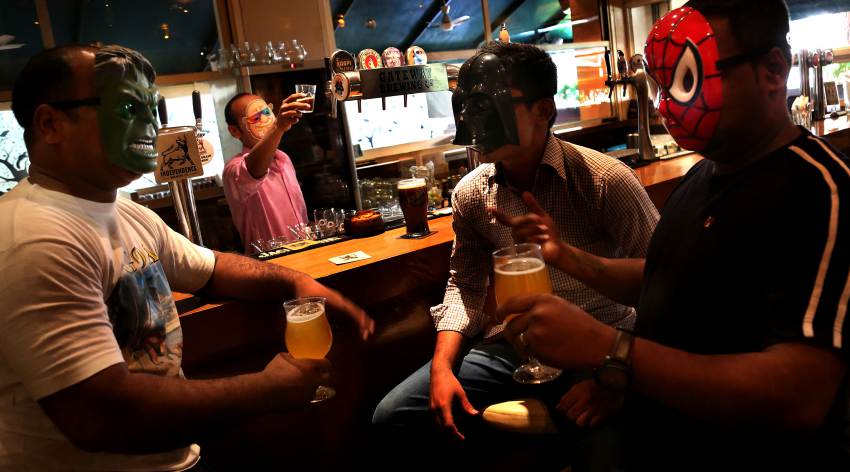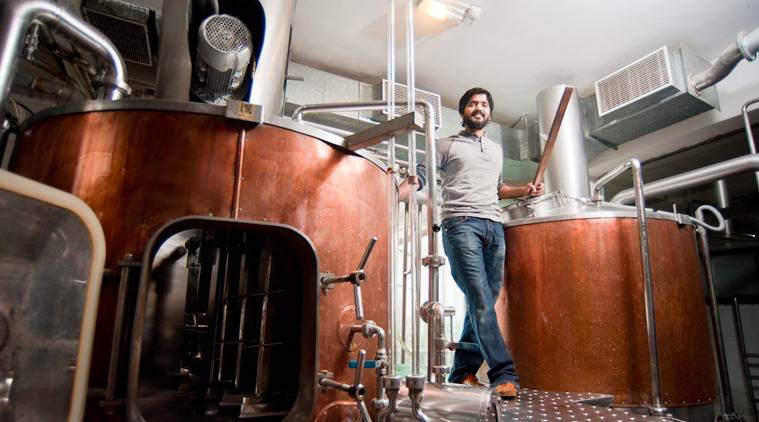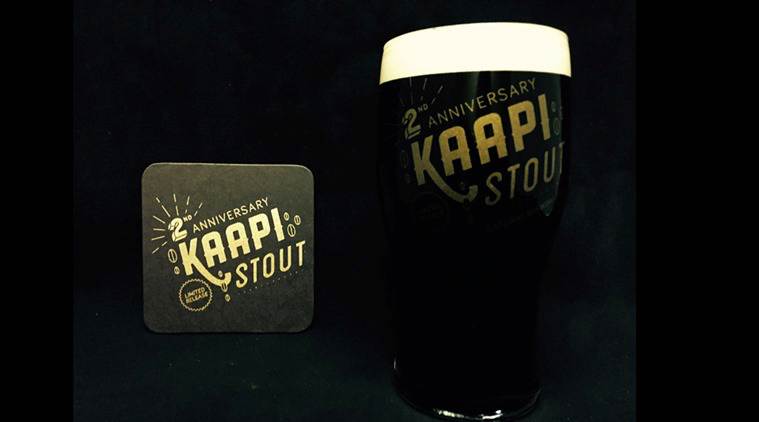
Mumbai’s home brewers prefer to stay under the radar. Photograph by Amit Chakravarty
“OK, we’ve got food, we’ve got beer. Let’s go.” I follow N down a dusty, unlit path that leads to a big white gate. Beyond it is a colonial cottage with a steeply pitched roof, pariah dogs with big, trusting eyes, and a gaggle of people gathered around a table that is populated with repurposed plastic bottles. Shards of conversation fly out at us, as we approach the table that is set on the extensive grounds of the cottage. Crickets whirr briskly in the background, and fizz rises like arias out of the bottles.
“Here we are,” says N, with a dramatic flourish. I can’t give you the precise details of where “here” is. That’s not just because N, who is some 6’4” and looms menhir-like over most people around him, has warned me not to. N and his compatriots are here, at this secret rendezvous near Mumbai, to drink beer that has been brewed at home. Home-brewing is illegal in India, and should the Excise Department get wind of it, you can’t even claim it to be some sort of nationalistic endeavour. Ancient Indians may or may not have invented airplanes and stuff, but the first beer was probably brewed in the Middle East, many thousands of kilometres away from even the fanciful boundaries of akhand Bharat.
“You could call me a yeast propagator,” says S, a Gujarati businessman in his late 20s, offering me a swig of his home brew, a blonde ale. Also on offer is a dainty lady’s strawberry ale, with actual pieces of strawberry in it; an IT professional’s mocha brown ale that has been steeped with crushed coffee beans; and, among others, a Belgian wheat beer that has been brewed by our host, a soft-spoken man in his early sixties. As is the case with anoraks of any kind, the hop heads speak in a strange tongue — “acetaldehyde”, “diacetyl”, “phenolic” pop up regularly, but the various beers I’m sampling are pretty good, and I find it easy to zone out and still look intelligent when I’m buzzed.
“Yeast is important. You use different kinds of yeast for different kinds of beer,” says S. “I culture and nurture different yeast strains in this little lab-like set-up I have. Some, I supply to craft breweries,
others I give out to home brewers. Ahmedabad, Delhi, Mumbai, Jaipur, Nagaland — you’d be surprised by the number of people who are brewing in this country.”

Anuj Mundi’s and Doolally’s Jaggery Pale Ale, made with jaggery sourced
from Kolhapur, was India’s first ever collaboration brew
It’s difficult to say just how many people are into home brewing in India, but most home brewers think it’s way above a thousand. They are also quick to add, though, that the number of dedicated brewers — those who brew at least once a month — is a lot less. “You have to be passionate,” says a Mumbai home brewer. “It is time-consuming. It takes over six hours to brew a batch of five to eight litres.”
“Bangalore has been buzzing for sometime, but Pune and Mumbai have been churning out some excellent brews of late,” says John J Eapen. Eapen, a former IT sales exec in America, is a “full-time beer evangelist” who blogs about beer, consults with breweries and conducts beer tours in Bangalore. “It’s a small but close-knit community and it’s constantly innovating. That is not something most microbreweries here choose to, or can afford to do.”

Kaapi Stout, a collab brew, tastes like a beer dreaming of a good single estate coffee
The “close-knitted-ness” is visible on social media and websites dedicated to brewing in India, on which the home-brewers share tips and recipes, and source ingredients for each other, and in the city-specific chapters that meet at least once a month with intriguing beers infused with saffron and basil, or made with ragi.
Most home brewers are widely travelled, and have either studied or worked abroad, especially in America, where home brewing was federally legalised in 1978. The United States has over 4,000 craft breweries, and home brewing is almost as common as barbecuing in the backyard.
The popularity of home brewing has been concomitant with the steady rise of craft beer in India, and it is a huge vindication for a home brewer when a craft brewery collaborates with him, says Navin Mittal. Earlier this year, Mittal’s Gateway Brewing Co. teamed up with B, a Mumbai-based home brewer, to launch the Kaapi Stout. The creamy Kaapi Stout tastes like a beer that is dreaming of a good cup of single estate coffee. “I love home brewers and often help them because they are big evangelists of craft beer,” says Mittal, a former home-brewer who is widely believed to have been a catalysing influence on the scene in India.
2016 has already seen two more collaborative brews. Last month, Pune’s home brewers worked with the Effingut Brewerkz on a Marzen beer, while Bangalore’s enthusiasts co-developed a lemongrass paan ale with the Arbor Brewing Company. Eapen says that craft beer lovers are in for fun times. “Now, there will be a lot of competition among the boys in each city to see who comes up with the next great collab brew.”
The Kaapi Stout is, by no means, India’s first collab brew. That honour belongs to the Jaggery Pale Ale, which Suketu Talekar’s Doolally co-developed with Pune-based home brewer Anuj Mundi in 2011. Apart from spreading awareness of the “goodness” of craft beer, Talekar finds another reason to be enthused about home brewing in India. “The next lot of craft brewery entrepreneurs will come from them. They will be more open to ideas and innovations than some people who are into microbreweries today.” Talekar could be right. Two home brewers in Pune are on the verge of setting up their own microbrewery, and the buzz is that there are yet others setting up craft breweries in Kolkata and Mangalore.
Despite the growing popularity of craft beer, the likes of Mittal and Talekar do not, however, expect the law to change any time soon. “These guys will have to keep a low profile. You don’t want to take any chances,” says Mittal. Which is how, I suppose, it will be. I have an invite for a secret meet-up next weekend. I don’t think I’ll be attending, but I’ll be there in spirit with the guys, who will probably be reflecting on life’s injustices and the government’s “misplaced priorities” with a home-brew in their hand and with their fingers crossed.









